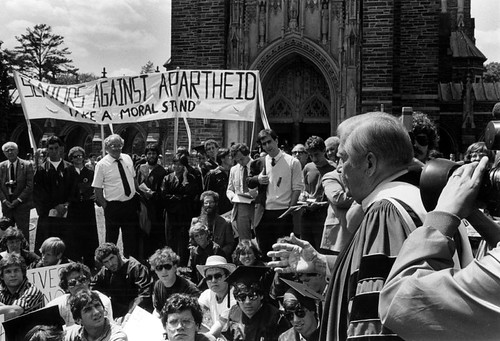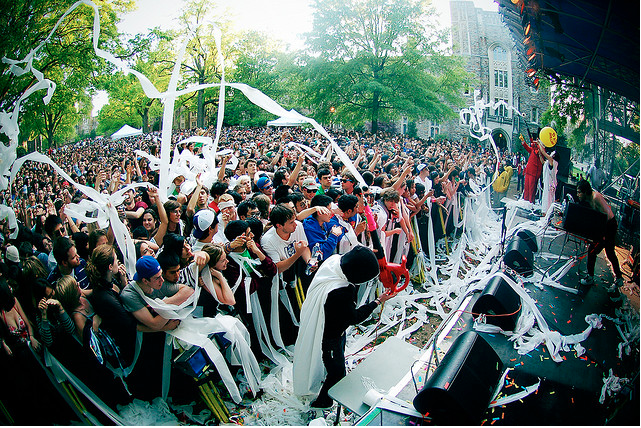Today, the events of 1967-1969 that took place on the Main Quad are commemorated both within and outside of the space.
For students at Duke during the late 1960s, the Main Quad was at times a place of protest. However, it was also a space of socialization and joyful memories. Interestingly, these two identities have continued to vie for the Main Quad throughout its history.

Davis, Sarah. 2006. "The scene on Duke's campus in 2006, as students demonstrated over allegations of rape involving members of the lacrosse team." ESPN. Accessed May 2012.
A Site of Memory
The Silent Vigil was physically re-enacted as part of “Act to Honor,” MLK Weekend 2012. Such a memorial to history at the site of memory in which it took place helps a site of protest’s identity carry over from past to present, inspiring future social activism.

Morr, Megan. 2012. MLK Act to Honor Weekend. From: Jackson, Camille. "Donna Brazile on King's Unfinished Work." 17 Jan 2012. Duke Today. Accessed May 2012.
Off-site Commemmorations
North Carolina has incorporated the Silent Vigil into its academic curriculum, which helps its memory to live on.
The Vigil is also celebrated on anniversaries of its enactment, such as in…(click for digitizations of articles)
Duke Magazine of March/April 1998
Duke Chronicle Special Insert 1988
Through the Years: A Space of Protest

"Apartheid demonstration," ca. 1986. Duke University Archives, Durham, NC. Flickr: Duke Yearlook. Accessed April 2012.
“Students protesting apartheid outside of the Duke Chapel. The demonstration was meant to voice students’ support of Duke’s divestment of all its holdings in South Africa. The protest hit home: on May 3, 1986, the Board of Trustees voted to withdraw all its South African investments.”
The Main Quad has remained a site of protest since the Vigil, a legacy that continues to live on today.

Morr, Megan. 17 Jan 2012. In: Jackson, Camille. 2012. "Donna Brazile on King's Unfinished Work." Duke Today. Accessed April 2012.
Above, students protest an unpublished study that claims black students are disproportionately more likely to switch out of the hard/natural sciences to “easier majors” – this mobilized humanities’ majors as well
The Occupy Duke received mixed reactions from Duke community members – many disagreed with the protest’s methods of blindfolding the James B. Duke statue, and did not think the movement had much direction. Like the protests of the 1960s, it was a controversial event, but unlike those days, the number of people participating was much lower. Times have changed.
Shifting Identities: A Normative Space of Socialization, Work, and Forgetting
Despite its role in protests, however, the Main Quad’s identity is ever-shifting; it is also a space for letting loose and having fun, or for going about one’s busy life – both of which constitute a certain “forgetting” of the space’s history.
It is important to memorialize these sites of memory to bring their identities of the past into conversation with identities of the present, and to educate the Duke and Durham communities about these sites’ amazing histories. What the students went through in the Silent Vigil’s many marches and the Allen Building’s many occupations in the late 1960s is truly remarkable, and the path to equality that they have tirelessly carved must neither be forgotten nor abandoned.



